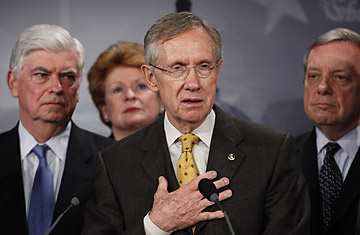
Senate majority leader Harry Reid, second from right — with Senators Chris Dodd, left; Debbie Stabenow, second from left; and Dick Durbin, right — speaks to the media about the Democratic health care bill on Nov. 18, 2009
With health reform's first test vote on the Senate floor less than 72 hours away, a platoon of top strategists — including pollsters Mark Mellman and Geoff Garin, incoming White House communications director Dan Pfeiffer and deputy White House chief of staff Jim Messina — met with Democratic Senators Thursday afternoon to impress upon those who might be wavering that everyone's political fate is now joined with the success or failure of President Obama's top domestic priority.
Addressing the Senators over lunch in the Mansfield Room just off the chamber, Mellman quoted Benjamin Franklin: "We must all hang together, or assuredly we shall all hang separately." According to one person who was there, Mellman invoked memories of 1994, when the party lost control of both houses of Congress in the wake of its failure to enact Bill Clinton's health care initiative. And he noted that the chief casualties in that election had been moderates, many of whom had tried to distance themselves from the President. What Democrats will need more than anything else in this midterm-election season, Mellman said, is for Obama and his agenda to succeed.
The White House team also pledged whatever support the Senators might want, including visits to their states by Vice President Biden and making Administration officials available for interviews with home-state media. Some of the very tactics that helped get Obama elected, the team said, could be brought to bear now. Messina told them it will be important to achieve parity against the opposition on the airwaves, with paid advertising and surrogates; to overwhelm them with ground organization; and to "stand for something, go for it, and always play offense."
Members of the team also said it is important to frame the message carefully — emphasizing, for instance, estimates by the Congressional Budget Office that the health overhaul will save money in the long run, reassuring seniors who are afraid of seeing Medicare cut and stressing new provisions like ones that would protect people from becoming uninsurable as a result of pre-existing health conditions.
But the Republicans are readying their message as well. "After six weeks of drafting a bill behind closed doors, the majority has produced a bill that increases premiums, raises taxes and slashes Medicare by half a trillion dollars to create a new government program," minority leader Mitch McConnell said on the Senate floor Thursday. "This is not what the American people want. I don't believe they think this is reform. This is not the direction to take."
A day after receiving a positive budget score from the CBO for his health-reform bill, Senate majority leader Harry Reid told his caucus that he hopes to hold the first test vote — on the motion to proceed — by 8 p.m. on Saturday. In the face of a promised GOP filibuster, that will require 60 votes, which is exactly the number Reid has in his Democratic caucus. While several Democrats have yet to commit to voting with Reid on the motion to proceed, the majority leader is "reasonably confident" that they will be with him when the time comes, says spokesman Jim Manley. "The whole goal right now is simply to get on the bill, and then we'll start some old-fashioned legislating." More questionable is whether Reid can muster 60 votes several weeks from now, when he presses to end debate and move to final passage.
The real fights — including those over provisions in the bill like a government-run public option and its language allowing abortion coverage if it is paid for by private funds — are not likely to come until some time in December. Then, if it passes the Senate, it will move into a conference committee with the House, where the two chambers will hash out some significant differences over abortion (the House bill has far more restrictive language than the version now before the Senate), the public option (the House version is almost certain to be more robust) and how to pay for the health overhaul (with the House favoring higher taxes on the wealthy and the current Senate version relying on new levies on high-priced insurance plans).
"The finish line is really in sight," Reid said as he unveiled his bill, which was a hybrid of legislation previously okayed by the Senate Finance Committee and the Health, Education, Labor and Pensions Committee. But no one knows better than Reid that it is still going to take a lot to get there.
